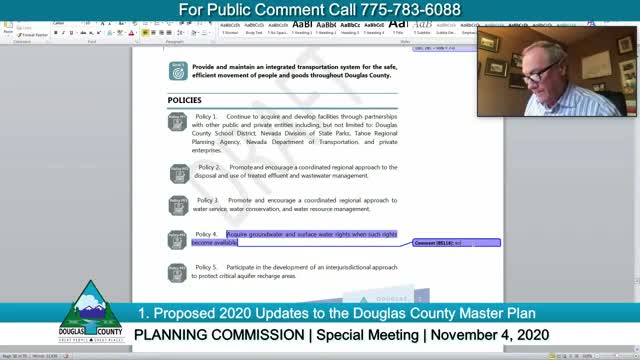Douglas County planning commissioners delete draft policy on county acquisition of water rights after heated debate
Get AI-powered insights, summaries, and transcripts
Subscribe
Summary
Commissioners voted 7-0 to remove a proposed master-plan policy that would have said Douglas County should “acquire groundwater and surface water rights,” after commissioners and staff raised legal and practical concerns about scope, intent and potential resale of rights.
Douglas County planning commissioners voted 7-0 on Nov. 4 to remove a proposed master-plan policy that would have directed the county to “acquire groundwater and surface water rights.” The commission agreed the policy, as written, was too broad and raised legal and operational questions about who could acquire water rights and whether the county should be open to buying and selling those rights.
The discussion began after commissioners reviewed Goal 4 language and moved into a focused debate on Policy 4, which used the word “acquire.” Commissioners and staff said the term was ambiguous and could be read as authorization for the county to buy water on the open market and re‑sell it. “If we start sending it to Silver City or whatever up that way, I mean, it’s only gonna tap our groundwater worse,” Commissioner Brian said during the meeting. “It’s not something I’m in favor of.”
Why it mattered: Commissioners said they supported protecting local supplies, but they were split on whether the master plan should encourage county purchases of water rights. Several members noted limitations in county authority and the existing legal framework on what the county or developers may be required to provide.
Legal and staff cautions: Sam Taylor, representing the Douglas County District Attorney’s office, told the commission that many requirements that can be placed on developers are already set out in county code and Nevada law. “Most of the requirements that are placed upon a developer in terms of costs are already set forth in codes or the NRS,” Taylor said, cautioning that a broad policy could raise legal and practical issues.
Tom Dallaire, who spoke for county public works, explained the county and towns already hold some water rights and sometimes acquire them for service needs. He noted that public works may acquire groundwater or surface water rights to serve projects, and that towns or purveyors — not only the county — typically hold and manage service water rights.
Outcome and next steps: Commissioner Brian moved to delete Policy 4; Maureen seconded. The motion passed 7-0. Commissioners directed staff to take the concerns raised in the discussion — including the community’s interest in protecting aquifers, limits on county authority, and potential tools such as development agreements — and return with clearer, narrower options the commission could consider at a future meeting.
What stays the same: Commissioners did not eliminate the broader goal of protecting water resources. Several members suggested alternative wording for future policies — for example, focusing on preserving water rights within Douglas County, protecting critical aquifer recharge areas through interjurisdictional cooperation, or linking acquisitions to clearly defined, limited circumstances such as development-related conveyances.
Context: The debate occurred as part of a broader review of the county’s draft 2020 master plan update. Commissioners repeatedly emphasized the difference between (a) discussion and direction, (b) policies appropriate for a master plan, and (c) items that would be better addressed in ordinances or more detailed development-code revisions.
Ending: Commissioners voted unanimously to remove the drafted acquisition policy and asked staff to return with targeted options and explanatory language that clarify the county’s intended role in preserving water resources without creating an open-ended authority to purchase and transfer water rights.
